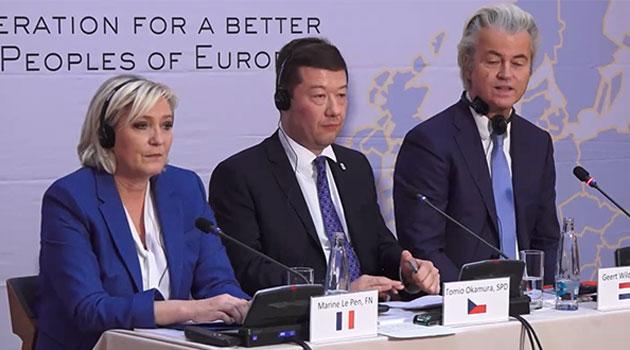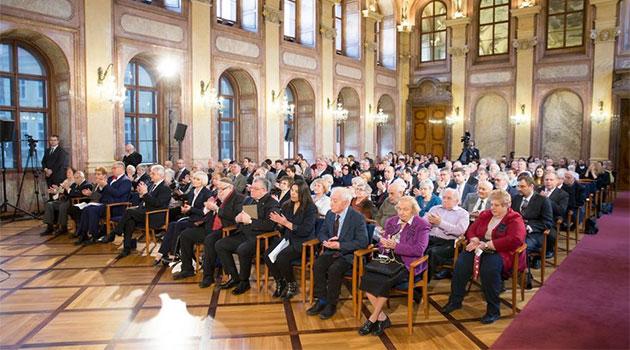Czech MP marks International Holocaust Remembrance Day by doubting what happened at Romani genocide site

The Czech Museum of Romani Culture is asking that Czech MP Tomio Okamura, a vice-chair of the lower house, publicly apologize for his remark about the WWII-era concentration camp for Romani people at Lety u Písku. In an interview for the online DVTV television channel on Saturday, International Holocaust Remembrance Day, Okamura referenced a book that he alleged has described the camp as having not been fenced and people being free to come and go from it.
According to experts from the museum, his allegations are untrue, are sparking anti-Romani sentiment in society, and are trampling on the memory of the victims of the genocide and persecution of Romani people during the Second World War. In the interview filmed at the campaign headquarters of the newly-elected Czech President Zeman, Okamura is asked by reporter Daniela Drtinová of DVTV whether he still doubts Lety was a concentration camp and answers: “So now I do not know exactly what this is about, but that camp at Lety, it’s true that many Jewish victims have turned to me, I have many friends who are Jewish, and they were Auschwitz victims, and they asked me why in the Czech Republic we are putting the camp at Lety on the same level as the extermination camp at Auschwitz.”
“I looked at the quote from [former] President Klaus on this matter, and when I looked at a book from the Academy of Sciences called ‘The Lety Camp, Facts and Myths’, it states, for example, that the camp was not fenced and that basically those people were free to come and go,” Okamura mendaciously said. When the reporter then asked whether that means the people did not die there as a result of genocide, Okamura would not answer and began to vulgarly insult the media outlet she works for.
“We consider it our duty to point out that the allegations made by Tomio Okamura about the Lety camp are untrue and that the source he cites does not exist. The truthless claims of Mr Okamura are used by him as a political instrument to spark anti-Romani sentiment in society and to nefariously trample on the memory of the victims of the genocide and persecution of Romani during the Second World War,” the museum’s letter states.
Letter from the Museum of Romani Culture (full translation)
The Museum of Romani Culture feels the obligation to comment on the remarks by Mr Tomio Okamura that were made on 27 January 2018 in his interview with Daniela Drtinová for DVTV. In that interview, which Okamura gave in connection with the presidential elections, Drtinová asked him as a vice-chair of the Chamber of Deputies to clarify his views on what was once called the Gypsy Camp at Lety u Písku. She clearly specified which period of the camp she had in mind by asking whether Okamura was doubting the existence of the concentration camp at Lety intended for Romani people. There cannot, therefore, be any doubt as to whether Tomio Okamura was being asked about the times when the site of the Lety camp was used as the headquarters for a labor unit, as a disciplinary labor camp, or as an internment camp. Romani families and others who were considered in the discourse of the time as “Gypsy”, including children, elderly people and women, were interned en masse at Lety between August 1942 and August 1943, when the camp was officially called Zigeunerlager I.
Okamura, in his answer to the question, said that on the basis of remarks made by former President Václav Klaus and a book he called ‘The Lety Camp, Facts and Myths’, allegedly published by the Academy of Sciences of the Czech Republic, he has formed the opinion that the Lety camp was not fenced and the persons interned there were not restricted in their freedom of movement.
The Museum of Romani Culture feels obliged to object in the strongest possible terms to all of the above-mentioned distortions of the historical facts from the mouth of Tomio Okamura about what was called the Gypsy Camp at Lety u Písku. From 1940 to 1943, i.e., from time the disciplinary labor camp was established until the time when what was called the Gypsy Camp was razed to the ground, the facility was enclosed by a high wooden fence with barbed wire on its upper part and was patrolled by armed guards. The evidence for this is not just written sources from the day and eyewitness testimonies, but also photographs. The Academy of Sciences of the Czech Republic issued a publication called “Historians and the Case of Lety” on the issue of the Lety camp in 1999. That publication does not contain any claims that what was called the Gypsy Camp at Lety was not fenced. Neither the Academy of Sciences nor any other entity has ever released a publication called “The Camp at Lety, Facts and Myths” (Tábor v Letech, fakta a mýty).
We consider it our duty to point out that the allegations made by Tomio Okamura about the Lety camp are untrue and that the source he cites does not exist. The truthless claims of Mr Okamura are used by him as a political instrument to spark anti-Romani sentiment in society and to nefariously trample on the memory of the victims of the genocide and persecution of Romani during the Second World War. In addition, his doubts and his mendacious representations also discredit the historical research undertaken on this subject to date. Given the relentless march of time, we are losing the eyewitnesses to the tragic events of the Holocaust of Romani people, as well as the representatives of the first generation of historians who pioneered research about this subject. We call for the memories of these persons to be honored and we emphatically ask Tomio Okamura for a public apology to the victims of the Nazi-initiated genocide and persecution for trampling on their memories, as well as an apology to the historians and other professionals involved with this subject for mendaciously distorting their writings.
